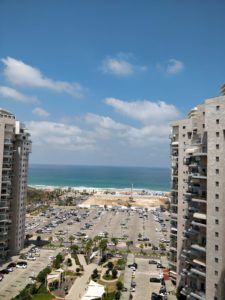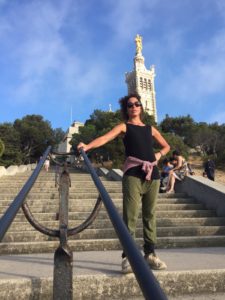by Haviva Ner-David

This past August 9th was the first official meeting of FSHD Israel, initiated by my 18-year-old daughter Hallel after we represented Israel in the first International FSHD Conference in Marseille in June. We were an intimate group of twelve – some FSHDers (including myself) and some our partners and/or care takers – who met on a seasonably hot Friday in the home of one FSHDer, with her beautiful view of the sea.
She had requested that the meeting be in her home not because of the view – although it was certainly a plus for us all—and not because she lives in the center of this tiny country which is smaller than the State of New Jersey – although that was certainly convenient – but because it is difficult for her to leave her home, as she can only drive short distances due to her muscle weakness and has to be on a BiPAP breathing machine for part of the day.
Laid out on the coffee table was a plentiful spread of fruit, cakes and chips. But the food lay untouched, as participants were too absorbed in the conversation to think of food.
Ages of participants ranged from late teens to late fifties, and some had only mild signs of FSHD, while others had walking-assistance devices on their legs, while still others were in electronic wheel chairs. One woman had mainly only facial weakness, while another had weakness in her whole body except her face. One told of how she sleeps with her BiPAP, while another talked about how she could barely sleep at all until she obtained a prescription for medical marijuana for her shoulder and neck pain.
Three women in the room had never met another person with FSHD, while one writes a blog www.rollwithasmile.com (@rollwithasmileblog on IG) about living with FSHD, which has hundreds of worldwide readers. One woman said she had decided to adopt rather than risk a pregnancy with FSHD, while another had six biological children (all delivered by C-section) plus one adopted child.
Yet another woman said she had decided to forego marriage and children because of her FSHD, while another had been in the midst of the procedure to implant donor embryos without FSHD only to discover she was already pregnant with her daughter (who indeed did end up having the gene and symptoms of FSHD). “It seems God had another plan for us than we did,” she said.
Remaining as active as possible while also being at peace with what we cannot do was an overarching theme of the discussion. The mood was serious yet lighthearted. For those for whom this was a first-time meeting others with FSHD and at various stages of the disease, it was especially emotional and even challenging. But for all it was certainly an exciting start. Mainly, it felt good to be together, to know that we are not alone.
One woman said she works from home and barely leaves her house but feels her life is full and rich, while another woman retired early when her FSHD became debilitating, but spends her time enjoying life and traveling when she can with her caretaker and electric wheelchair. Another woman went from full-time work to part-time, while another is self-employed and sets her own hours while also collecting disability payments. Another works full time and said it is important for her to be self-sufficient and get all of her work benefits, even if it means foregoing her eligibility to collect disability.

The main objective of this first meeting was to begin to create a feeling of togetherness and cooperation, and to start the momentum of creating an Israel FSHD support and advocacy group. We discussed our goals of working together to create more understanding and awareness in Israel around FSHD, and we shared tips about living with FSHD, names of knowledgeable and sympathetic medical professionals, and recent developments on the research front. And, of course, we lamented the not-as-handicapped-accessible-as-they-say-they-are facilities around the country and abroad.
After Hallel and I updated the group on the International conference in Marseille, we also discussed possibilities of volunteering to participate in research studies, raise money, and create connections with medical professionals and researchers here in Israel and abroad. While there was once a testing site here in Israel for the FSHD gene, it is no longer in operation. And our semi-socialized medical system does not cover all of the care we need. Although, as one participant pointed out, sometimes it is just a matter of knowing how to work the system to obtain the benefits that are rightfully ours.
These are but some of the problems we have to overcome, some of the battles we need to fight. But, we all agreed, there is strength in numbers.
After three hours of fascinating and animated discussion, it was time to part. We created a WhatsApp group so we can communicate more easily, and each left with an assignment and the commitment to reach out to others and seek out more people living in Israel with FSHD to join us. Since the meeting, we’ve already doubled the number of people in the group and have had some very active discussions. It is all very exciting! We are talking about doing a second larger meeting now that we are growing so quickly.
Here are ways to join FSHD Israel:
- Join the FSHD Israel Facebook group;
- From Facebook, ask to be invited to the WhatsApp group;
- Email me at rabbihaviva@gmail.com;
- Call or text me at 972544693469.
Haviva Ner-David is a 50-year-old writer, rabbi, social activist and spiritual director who lives in the Galilee and runs the only mikveh (ritual bath) in Israel open to all (where she facilitates water ceremonies and workshops). Visit her blog on Times of Israel, and especially this post from World FSHD Day. She lives on Kibbutz Hannaton with her life partner of thirty years and their seven children.She says that living with FSHD has been both the biggest challenge and one of the biggest blessing of her life.


Leave a Reply